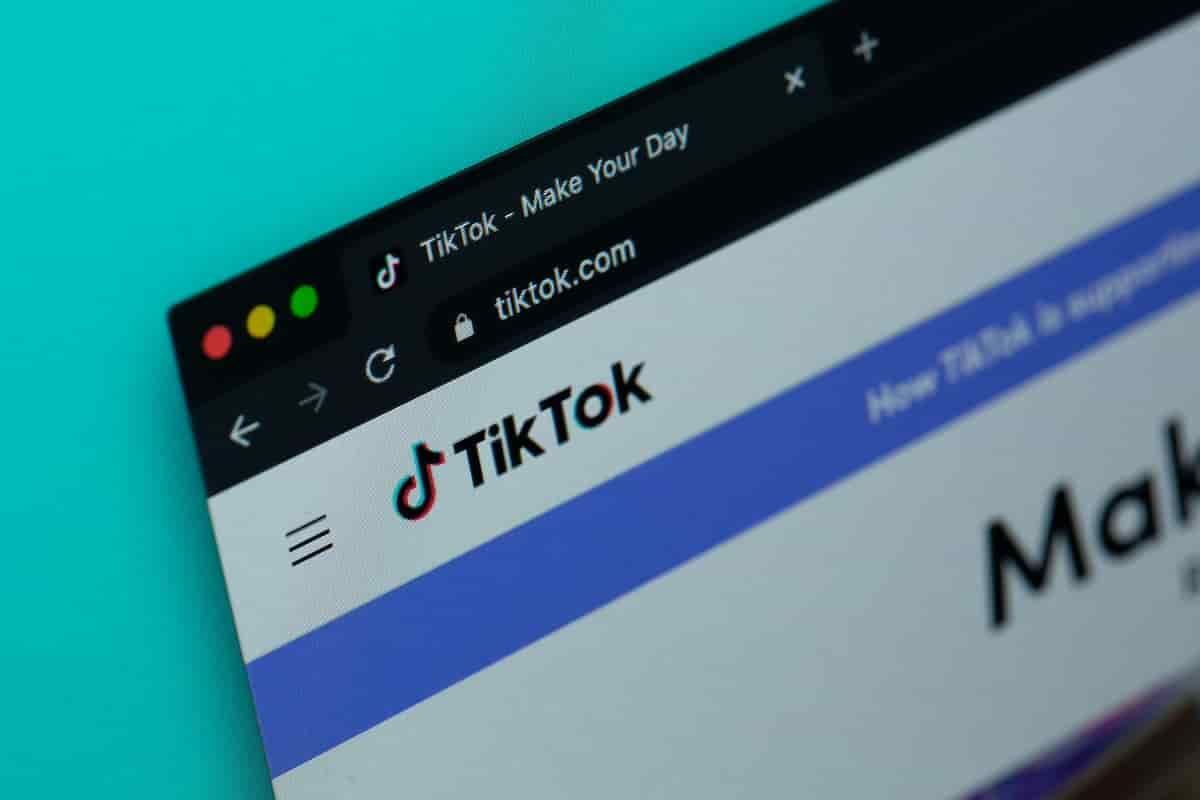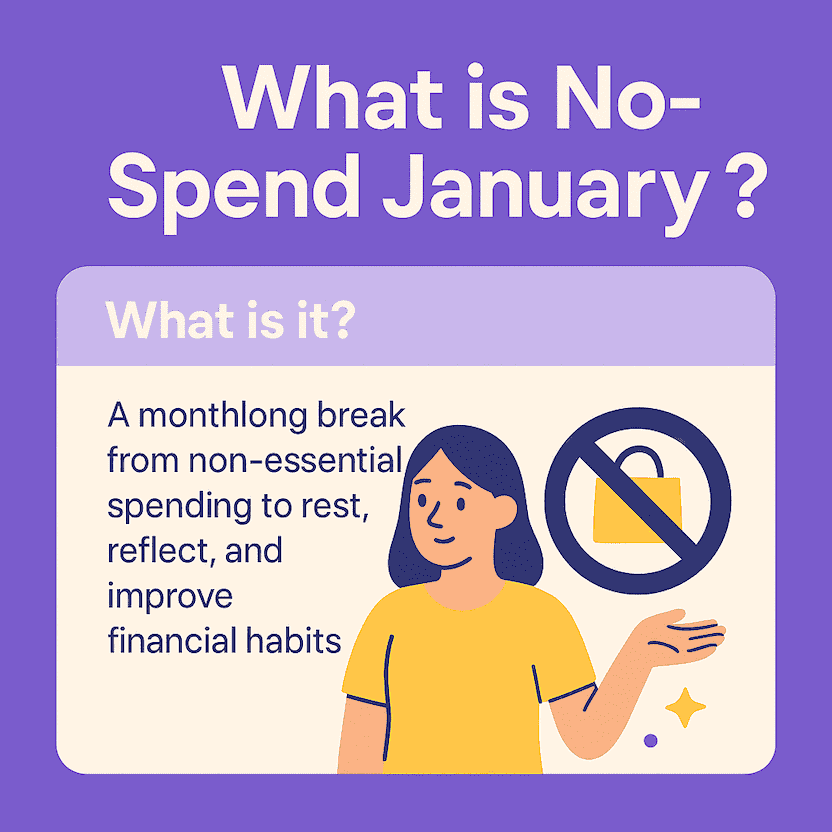Advertiser Disclosure
Last update: September 25, 2025
7 minutes read
What Is No-Spend January? The Worthwhile Viral Money Challenge College students are Doing
Discover No-Spend January, the viral money challenge helping college students cut costs, save hundreds, and build better financial habits after the holidays.

By Derick Rodriguez, Associate Editor
Edited by Yerain Abreu, M.S.
Learn more about our editorial standards



By Derick Rodriguez, Associate Editor
Edited by Yerain Abreu, M.S.
Learn more about our editorial standards
Staring at your post-holiday bank account feeling personally victimized by your December spending? Same. January hits different when you're counting change for coffee and questioning every life choice that led to buying another sweater you'll never wear.
Enter No-Spend January, probably the only TikTok challenge that won't land you in the emergency room or embarrass your future self. For 31 days, you buy only the absolute essentials. That's it.
The best part? People are actually saving serious money doing this.

Key takeaways
- No-Spend January means buying only essentials like rent, food, and textbooks for the whole month
- Students can save hundreds by cutting out extras like dining out and impulse shopping
- The challenge builds better money habits and helps you see where your cash really goes
What is No-Spend January?
It’s pretty straightforward. You only spend money on stuff you absolutely need for survival and basic functioning. Rent, groceries, gas, textbooks, medications. Everything else gets a hard no.
This challenge blew up on social media around 2019, and unlike most viral trends, it stuck around because it actually works. People post their progress, their struggles, their savings totals. There's something weirdly satisfying about watching your bank account not get demolished for once.
Your essentials list might include:
- Rent, utilities, insurance payments
- Groceries (actual food, not fancy stuff)
- Transportation costs
- Required school materials
- Medical expenses
- Minimum debt payments
Everything else, like coffee shop runs, impulse Amazon purchases, that cute top you saw, gets written down in a "maybe later" list instead.

TuitionHero Tip
Create your "essentials list" before January 1st. Writing it down makes you less likely to rationalize purchases in the moment.

Why January is perfect timing
January is basically designed for financial reality checks. You're broke from the holidays, classes are starting up again, and everyone's making resolutions they'll abandon by February.
Many students get financial aid refunds in January too. Financial experts note that if you maintain the positive habits from no-spend challenges, you could add thousands to your savings over a year. Instead of treating that money like found cash, you could actually build an emergency fund.
Plus, January is social hibernation season anyway. Your friends are probably just as broke, so suggesting movie nights at home instead of expensive dinners doesn't feel as weird.
Compare private student loans now
TuitionHero simplifies your student loan decision, with multiple top loans side-by-side.
Compare Rates
The money you’ll actually save
The numbers are pretty wild once you see them written down. College students spend an average of 40% of their monthly income on discretionary items like entertainment, apparel, and services, which means there's real money to be saved here.
To put that in perspective: students spend an average of $670 on food per month, with $410 going to eating off-campus. That's over $400 monthly just on restaurant food that could be redirected to your savings account.
What students typically save:
- Light spenders: $200-500
- Moderate spenders: $600-1,000
- Heavy spenders: $1,200-2,000+
One person documented saving $1,600 during their no-buy January, though your results will depend on your usual spending patterns.

TuitionHero Tip
When you feel the urge to buy something non-essential, wait 24 hours. Write down what you wanted to buy and why. Most of the time, the urge passes.
Setting yourself up to actually succeed
The difference between finishing strong and giving up halfway through comes down to planning ahead.
Before January 1st:
- Stock up on basics: Hit Costco or wherever for toiletries, cleaning supplies, and pantry staples. Running out of shampoo on day three will test your commitment unnecessarily.
- Define your rules clearly: Some people allow one emergency purchase under $25. Others create exceptions for required textbooks bought after classes start. Whatever you decide, write it down before you need it.
- Plan free entertainment: Students like Cameron Chabot, a UMass junior, spend between $270-300 weekly on various expenses, much of which goes to entertainment. Your campus probably has more free stuff than you realize, like movies, events, gym access you're already paying for through fees.
- Tell people what you're doing: Friends will be way more understanding about suggesting cheaper alternatives if they know you're doing a challenge, not just being weird about money.

TuitionHero Tip
When you want to buy something non-essential, write it down with the price and date. Come back in 24 hours and see if you still want it. Usually, you won't.
The obstacles you’ll definitely face
- Your friends will want to spend money: This is guaranteed. When someone suggests dinner out or a movie, have alternatives ready: "I'm doing this money challenge, but let's cook at my place instead" usually works.
- You'll want to shop when you're bored: The challenge encourages participants to abstain from buying anything but essentials, redirecting money toward debt payment or savings goals. Figure out what triggers your spending urges, like stress, boredom, seeing other people's purchases online, and have other activities ready.
- Unexpected expenses will pop up: Your phone breaks, you need a specific book that costs $80, your car needs repairs. Build some flexibility into your rules for actual emergencies versus things that are just inconvenient.
- FOMO will hit hard: Everyone else is still buying stuff and posting about it. Remember that social media isn't real life, and most people are probably broke too; they're just not admitting it.

TuitionHero Tip
Use a savings tracking app or simple spreadsheet to log money you don't spend. Watching the number grow provides serious motivation.
Making it stick beyond January
The real value isn't just the money you save, it's figuring out your spending patterns. People who complete the challenge often report feeling proud of sticking to their rules and gaining awareness about their habits.
What you might discover:
- You shop when you're stressed or bored
- Most of your money goes to food you don't even enjoy that much
- You buy things to feel productive instead of actually being productive
- Your "essentials" list is way shorter than you thought
Use February to create a budget based on what you learned. Maybe you do mini no-spend weeks throughout the year, or commit to waiting 48 hours before any purchase over $30.
That money you saved? Don't treat it as "extra" spending money for February. Put it in savings where it can actually help your future self.
Dos and don'ts of doing No-Spend January
Do
Make your essentials list before starting
Find free alternatives to your usual entertainment
Track what you're NOT spending to stay motivated
Allow for real emergencies
Celebrate small wins
Don't
Make rules so strict you'll definitely fail
Use the challenge to avoid necessary expenses
Compare your results to other people's online
Go on a pre-challenge shopping spree
Give up completely over one small slip-up

Why trust TuitionHero
At TuitionHero, we help you find the best private student loans by comparing top lenders and breaking down eligibility, interest rates, and repayment options. Whether you need additional funding beyond federal aid or a loan without a cosigner, we simplify the process. We also provide expert insights on refinancing, FAFSA assistance, scholarships, and student credit cards to support your financial success.
Frequently asked questions (FAQ)
Required school materials should definitely be on your essentials list. The challenge isn't about sabotaging your education.
Yes. Just make sure you decide before January starts. Some people allow them since it's not new money being spent, and others save them for February.
Existing subscriptions don't count as new spending, but January might be a good time to cancel ones you don't actually use.
Focus on nutritious, filling foods rather than expensive specialty items. Rice, pasta, eggs, and seasonal vegetables will keep you fed without breaking your challenge.
Frame it as a personal challenge rather than a money problem. Most people respect someone working toward a goal.
Final thoughts
Unlike most viral challenges, No-Spend January addresses a real problem: over 70% of college students say the high cost of living is their main concern at school. It's not about deprivation; it's about awareness and control.
Whether you save $300 or $1,500, the real win is proving to yourself that you can distinguish between wants and needs. That confidence carries over into other areas of your financial life.
Even if you mess up halfway through, you'll still probably save money and learn something about your spending habits. Perfect execution isn't the point; building better awareness is.
This is one internet trend that might actually help your bank account instead of emptying it. Start planning now, stock up on essentials, and see what happens when you give your wallet a month-long break.
Source
Author

Derick Rodriguez
Derick Rodriguez is a seasoned editor and digital marketing strategist specializing in demystifying college finance. With over half a decade of experience in the digital realm, Derick has honed a unique skill set that bridges the gap between complex financial concepts and accessible, user-friendly communication. His approach is deeply rooted in leveraging personal experiences and insights to illuminate the nuances of college finance, making it more approachable for students and families.
Editor

Yerain Abreu
Yerain Abreu is a Content Strategist with over 7 years of experience. He earned a Master's degree in digital marketing from Zicklin School of Business. He focuses on college finance, a niche carved out of his journey through the complexities of academic finance. These firsthand experiences provide him with a unique perspective, enabling him to create content that's informative and relatable to students and their families grappling with the intricacies of college financing.
At TuitionHero, we're not just passionate about our work - we take immense pride in it. Our dedicated team of writers diligently follows strict editorial standards, ensuring that every piece of content we publish is accurate, current, and highly valuable. We don't just strive for quality; we aim for excellence.
Related posts
While you're at it, here are some other college finance-related blog posts you might be interested in.
Shop and compare student financing options - 100% free!

Always free, always fast
TuitionHero is 100% free to use. Here, you can instantly view and compare multiple top lenders side-by-side.

Won’t affect credit score
Don’t worry – checking your rates with TuitionHero never impacts your credit score!

Safe and secure
We take your information's security seriously. We apply industry best practices to ensure your data is safe.
Finished scrolling? Start saving & find your private student loan rate today
Compare Personalized Rates




